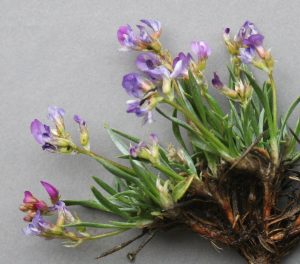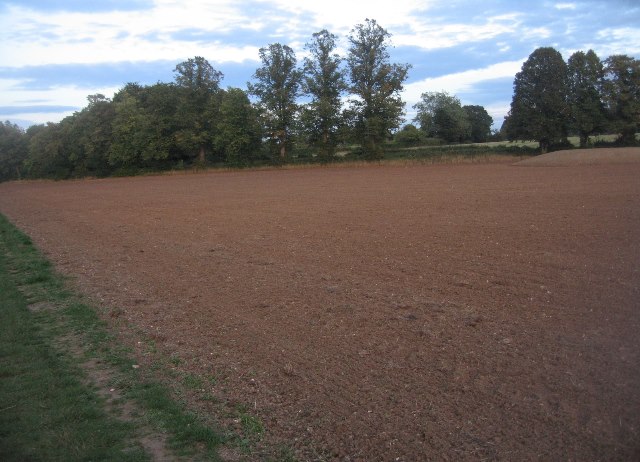Winter is often a desolate time for farm fields. Often times they lay bare, the crops harvested and sold, the weather too cold to plant again. But researchers in China have finished conducting a long-term study at the Chinese Academy of Agricultural Sciences in Hunan Province that suggests farmers should cover their winter soil with green manure. Green manure is another way of saying cover crops, which are planted when cash crops do not occupy the soil. The need for research on cover crops has emerged from the issue of fertilizer use, which has boosted yields but has slowed the efficiency at which these crops are able to take up the nutrients. This is not only costly for farmers who end up wasting fertilizer, but previous studies have shown that it’s also harmful to the air and soil, causing soil acidification and degraded soil structure.

Milkvetch, the highest performer of the study.
Courtesy of NRCS Montana
From 1983 to 2016, researchers explored how incorporating green manure into rice rotations effect yield sustainability, soil nutrients and how they’re balanced, and enzyme activity. Yield sustainability was calculated using the sustainable yield index (SYI), which represents actual yields over long periods of time. The higher your SYI, the more likely it is that the area will produce high yields over a long time period. The four cropping treatments used were rice-rice-fallow, rice-rice-milkvetch, rice-rice-rapeseed, and rice-rice-ryegrass. Each treatment was replicated three times.
What these researchers found makes a pretty good case for green manure use. They found that green manures significantly increased yields and SYI. Milkvetch performed exceptionally well – trumping the fallow treatment in terms of grain yield by 45% in early harvested rice and 46% in late harvested rice. Soil pH was also found to be lowest in the milkvetch treatment. The green manures also resulted in more soil contents of carbon, nitrogen, and phosphorous- all essential nutrients for plants.
So what’s milkvetch’s secret? Well, most researchers think that it performed so well because it’s a legume. This plant family has the unique superpower of being able to fix nitrogen in the soil. This is really important because nitrogen is a nutrient that plants need to grow, but most nitrogen occurs in the atmosphere where plants can’t access it. Legumes have nodules on their roots called rhizobia that are able to biologically fix this atmospheric nitrogen into the soil where plant roots can access it. Hopefully this research will encourage farmers to cover their winter soil with green manure instead of letting it go naked.
Article:
Qaswar, M.; Huang, J.; Ahmed, W.; Li, D.; Liu, S.; Ali, S.; Liu, K.; Xu, Y.; Zhang, L.; Liu, L.; Gao, J.; Zhang, H. Long-Term Green Manure Rotations Improve Soil Biochemical Properties, Yield Sustainability and Nutrient Balances in Acidic Paddy Soil under a Rice-Based Cropping System. Agronomy 2019, 9, 780. https://www.mdpi.com/2073-4395/9/12/780

Alex
"This title was very eye catching! That is so interesting that such a ..."
Alex
"This is really interesting! The fact that crops and plants are damaged is ..."
Alex
"Well done, this article is great and the information is very captivating! Ethics ..."
Alex
"I was intrigued throughout the whole article! This is such an interesting topic, ..."
Alex
"This is such an interesting article, and very relevant!! Great job at explaining ..."
Grandpa
"Honey You Did a good job I will forward to my eye doctor "
murphymv
"This article is fascinating because it delves into the details of the research ..."
murphymv
"I agree, adding the photo helped solidify the main finding. "
murphymv
"This is a fascinating finding. I hope this innovative approach to improving transplants ..."
Sherzilla
"This is a great article! I would really love to hear how exactly ..."
Sherzilla
"It's disappointment that these treatments were not very effective but hopefully other researchers ..."
Sherzilla
"I agree with your idea that we need to shift our focus to ..."
Sherzilla
"It's amazing to see how such an everyday household product such as ..."
Lauren Kageler
"I will be interested to see what the data looks like from the ..."
Lauren Kageler
"A very interesting article that emphasizes one of the many benefits that the ..."
maricha
"Great post! I had known about the plight of Little Browns, but I ..."
Sherzilla
"I assumed cancer patients were more at risk to the virus but I ..."
Sherzilla
"Great article! It sheds light on a topic that everyone is curious about. ..."
maricha
"This article is full of really important and relevant information! I really liked ..."
maricha
"Definitely a very newsworthy article! Nice job explaining the structure of the virus ..."
maricha
"It's interesting to think that humans aren't only species dealing with the global ..."
murphymv
"This is very interesting and well explained. I am not too familiar with ..."
Lauren Kageler
"Great article! This post is sure to be a useful resource for any ..."
Lauren Kageler
"Definitely seems like an odd pairing at first, but any step forward in ..."
murphymv
"What an interesting article! As you say, height and dementia seem unrelated at ..."
murphymv
"Great article! I learned several new methods of wildlife tracking. This seems like ..."
murphymv
"Very interesting topic! You explained cascade testing and its importance very well. I ..."
Alex
"This article is really interesting! What got me hooked right away was the ..."
Sabrina
"I found this article super interesting! It’s crazy how everyday products can cause ..."
Erin Heeschen
"I love the layout of this article; it's very eyecatching! The advancements of prosthetics ..."
murphymv
"Awesome article! I like the personality in the writing. Flash Graphene not only ..."
murphymv
"Very interesting work! I don't know a whole lot about genetics, but this ..."
Cami Meckley
"I think the idea of using virtual reality technology to better help prepare ..."
Erin Heeschen
"I wonder if there's a connection between tourist season and wildfires in the ..."
Ralph berezan
"Not bad Good work "
Michelle
"This sounds like it would be a great tool for medical students! ..."